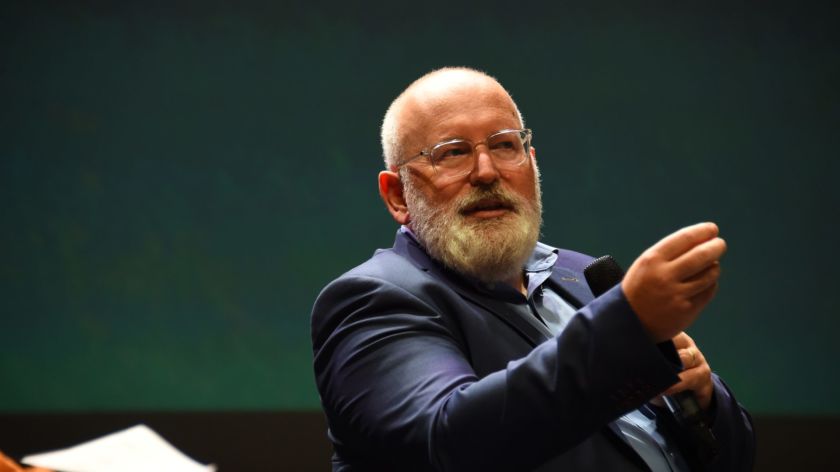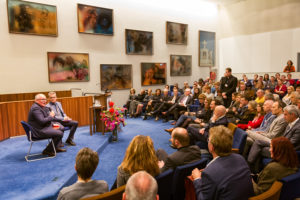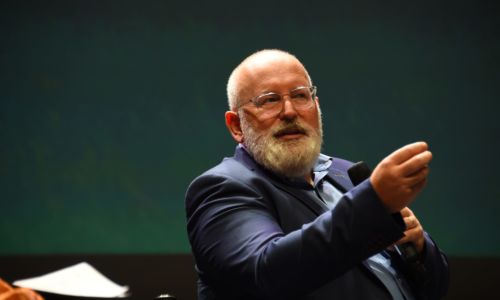Frans Timmermans: ‘Putin won’t win, the courage of Ukrainians is too great’
-
 Frans Timmermans. Photo: EU.
Frans Timmermans. Photo: EU.
Today, European Commissioner and former Radboud student Frans Timmermans (61) will receive the Treaties of Nijmegen Medal. For his ‘commitment to peace and cooperation in Europe’.
Doesn’t it feel a little uncomfortable: receiving a peace prize in times of war in Europe?
‘Not uncomfortable. But it does force me to think very deeply: how do we make peace happen again? How can we give everyone who is in this terrible situation a new perspective?’
What does this award mean to you?
The Treaties of Nijmegen Medal
The Treaties of Nijmegen Medal is an award that is presented once every two years to a leading international figure who has made an exceptional contribution to Europe.
The award is named after the European peace treaties that were signed in 1678 and 1679 in Nijmegen and elsewhere. The medal is an initiative of the municipality of Nijmegen, the Radboud University and chip manufacturer NXP, with support from the Ministry of Foreign Affairs.
‘I see it mainly as an acknowledgement of my great teacher, politician, and top diplomat Max van der Stoel. I was allowed to stand on his shoulders. He taught me that even in the most stable, self-confident democracies, freedom can come under pressure. Here too. If the lie is big enough, sooner or later people will believe it. Peace and security can never be taken for granted, they require constant meticulous maintenance.’
You are a man of solidarity and the rule of law. Do you think, in your heart of hearts, that we are abandoning the Ukrainian people?
‘No, I really do not. On the contrary, I find it heartwarming how Europe shows solidarity with the four million Ukrainians who are on the run. Of course, there is frustration that we cannot intervene. I have a personal connection with the country and the people there. This war makes me extremely sad.’
But we are largely standing by.
‘I do not agree with that. President Zelenski wants money, support, and weapons. He gets those, too. If I add it all up, he has now received 60 billion euros in financial support. That is about as much as the Russian defence budget. But no, we are not going to attack. Then you run the risk of a Third World War.’
We will have to show that we will not allow ourselves to be divided. That we show solidarity.
On the war in Ukraine, you said this week: ‘We will feel the consequences of the Russian invasion for generations to come’.
‘The Ukrainian people are confronted with total barbarism. Deep wounds are being inflicted. It will not be over when the shooting stops. We have to accept that there will be a longer period of instability in Europe. Reconciliation takes decades. Think of Germany after the Second World War.’
You have met Putin several times in the past. What has happened to him?
‘I see a man who first used the idea of a great Russian empire primarily as a tool to unite that great country. Then he really started to believe in that ideology. He must have thought: I am almost 70, now our oil and gas are still worth a lot of money: if I ever want to restore the old Russian Empire, I have to do it now. That is what I think.’
Should we fear the Russians again, as we did during the Cold War?
‘In any case, we should not give the Russians reason to think that they can rule here. That is not the same as being afraid. We must prepare ourselves well for a possible threat. We must have our defences in order. Much more important, however, is that we show that we will not allow ourselves to be divided. That we show solidarity.’
We must get rid of Russian gas. We cannot replace all of that with sustainable energy immediately. This makes delaying your European climate policy seem inevitable.
‘No. On the contrary, we are accelerating! Now that energy prices are so high, I see a need in all member states to switch to wind and solar energy even faster. We can never again afford to be dependent on such an unpredictable energy supplier.’
Dutch environmental organisations have criticised the awarding of the Treaties Medal to you. Mostly because you consider the burning of biomass to be green energy. This would go hand in hand with ecological abuses.
‘They are just plain wrong. We cannot make the energy transition without biomass! But it must be the right biomass. Not like in the past, when whole trees from Estonia were shredded and ended up in Dutch incinerators. That is why we have amended the legislation. It has to be residual wood.’

Today you return to Nijmegen, where you studied at the university from 1980 to 1985.
‘This city has shaped me. I fell in the middle of the squatters’ riots and occupation of the Erasmus building. For me, it was a period of political awareness. During my time at the university, I felt like my head was opening up, like I was coming out of a cage.’
In Nijmegen, as in many other towns and villages, there are hundreds of Ukrainian refugees. What message do you have for them?
‘That there is hope. For me, it is clear that Putin cannot win this war. This is his Waterloo. This torment will end. What do I base this on? I am inspired by the unprecedented courage of the Ukrainian people, who defend themselves at all costs. A people that fight for the democratic for the democratic values that we also stand for, and is even prepared to die for them, deserves our continued support.’
This article also appeared in today’s edition of the Gelderlander. By Harm Graat and Niek Opten.

